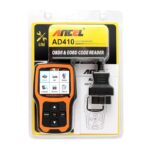The OBD2 port, a standardized 16-pin connector, allows you to access your car’s diagnostic data. Understanding the pinout, particularly for devices like the Foseal OBD2 adapter, is crucial for troubleshooting and monitoring your vehicle’s performance. This article will delve into the function of each pin on a Foseal OBD2 connector.
Decoding the 16 Pins of a Foseal OBD2 Connector
Each pin on the Foseal OBD2 connector has a specific function, enabling communication between your vehicle’s Engine Control Unit (ECU) and diagnostic tools. While the core functions remain consistent across OBD2 standards, manufacturers may utilize certain pins for proprietary purposes.
Standard OBD2 Pin Functions:
- Pin 1: Often unused.
- Pin 2: J1850 Bus+ (SAE J1850 PWM protocol) for Ford and GM vehicles. Some Chrysler models use this for CCD bus communication.
- Pin 3: Reserved for future use.
- Pin 4: Chassis Ground.
- Pin 5: Signal Ground.
- Pin 6: CAN High (CAN-H) for communication on the Controller Area Network (CAN bus).
- Pin 7: ISO 9141-2 K-Line (for diagnostic communication in some European and Asian vehicles).
- Pin 8: Reserved for future use.
- Pin 9: Reserved for future use.
- Pin 10: J1850 Bus- (SAE J1850 PWM protocol) for Ford and GM vehicles.
- Pin 11: Reserved for future use.
- Pin 12: Reserved for future use.
- Pin 13: Reserved for future use.
- Pin 14: CAN Low (CAN-L) for communication on the Controller Area Network (CAN bus).
- Pin 15: ISO 9141-2 L-Line (for diagnostic communication in some European and Asian vehicles).
- Pin 16: Battery Power.
Foseal OBD2 and Compatibility:
The Foseal OBD2 adapter, like other quality OBD2 devices, adheres to these pinout standards, ensuring compatibility with a wide range of vehicles. Using a reliable adapter, like the Foseal, is crucial for accurate data retrieval and avoiding potential communication errors.
Utilizing the Foseal OBD2 Adapter:
Connecting the Foseal OBD2 adapter to your vehicle’s OBD2 port allows you to use diagnostic software and apps to:
- Read and clear Diagnostic Trouble Codes (DTCs) or fault codes, often referred to as “check engine light” codes.
- Monitor real-time sensor data like engine RPM, coolant temperature, and fuel pressure.
- Perform emissions readiness checks.
- Record and analyze trip data, including fuel consumption.
Choosing a Reliable OBD2 Adapter:
While many OBD2 adapters are available, opting for a reputable brand like Foseal ensures reliable performance and accurate data. Avoid cheap, generic adapters, as they can cause communication issues and potentially harm your vehicle’s systems.
Conclusion
Understanding the Foseal Obd2 Pinout provides valuable insight into how your vehicle communicates diagnostic information. Utilizing a reliable OBD2 adapter like the Foseal, coupled with quality diagnostic software, empowers you to monitor, troubleshoot, and maintain your vehicle effectively. Always choose a trusted brand to ensure accurate data and safeguard your car’s electronic systems.

